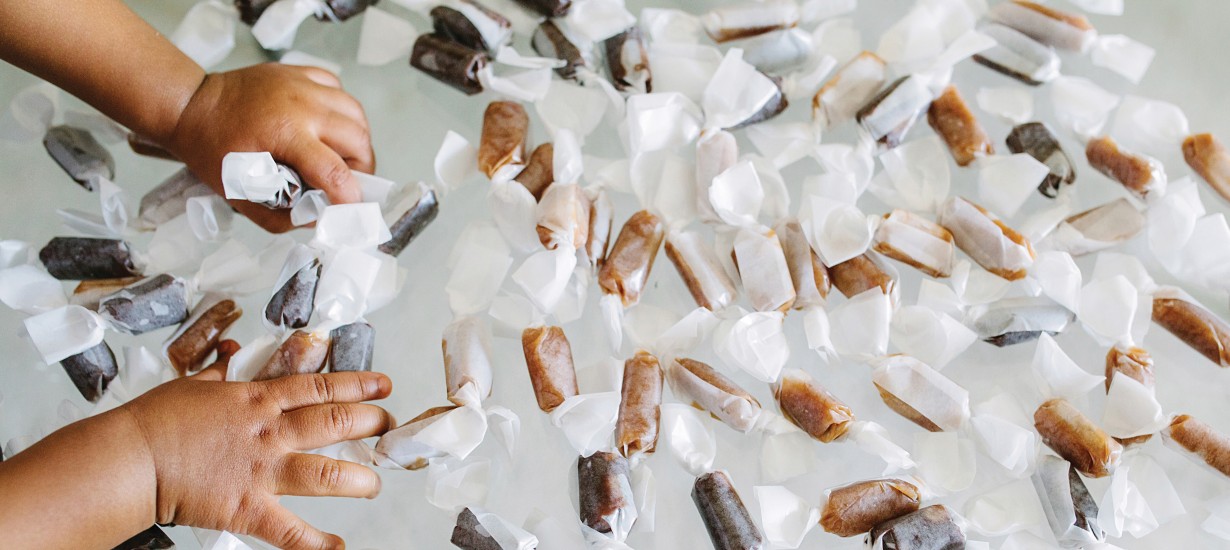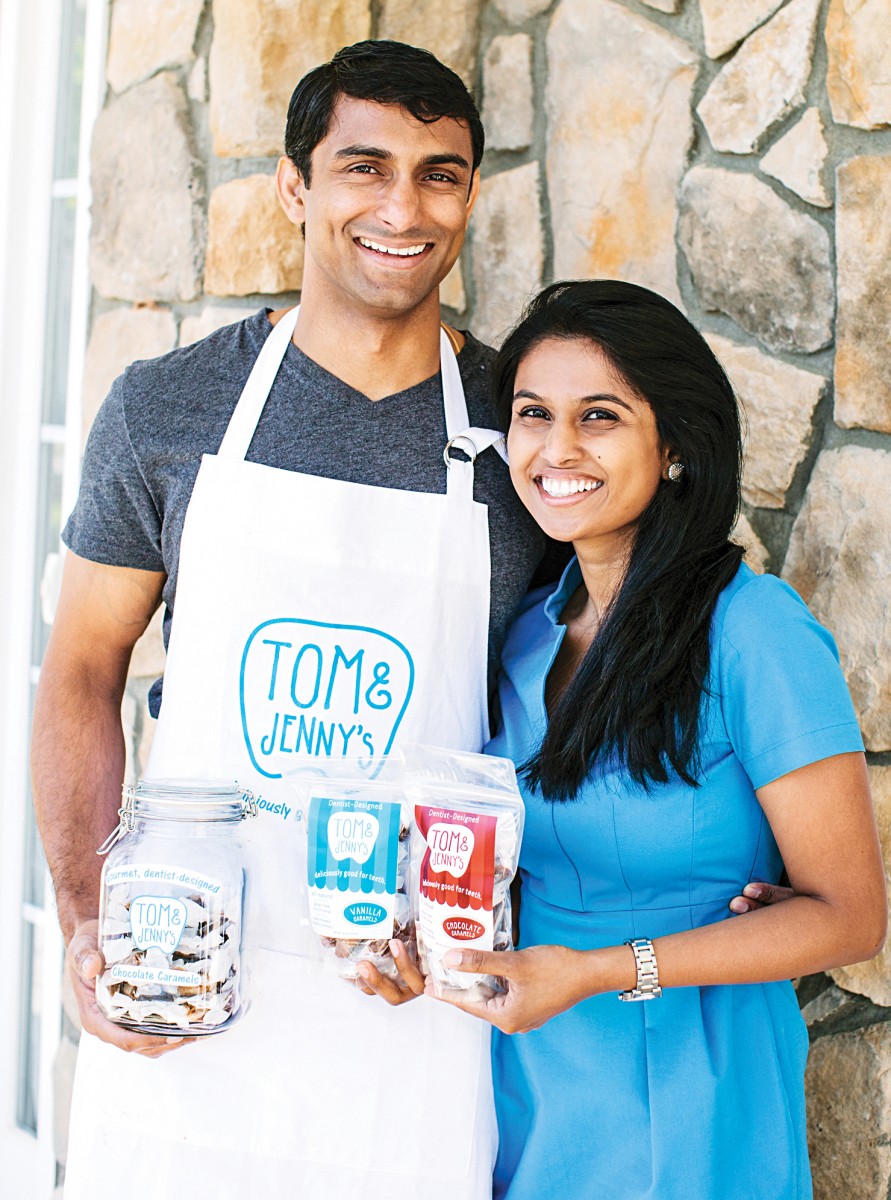Look, Mom, No Cavities!

When you grow up to be a dentist with a childlike love of sweets, you make candy you can recommend.
Free candy was everywhere Dr. Sindhura Citineni ’04 looked during her pediatric dental residency in New York, and it was all the good stuff that populates the best Halloween treat bags — the satisfying Snickers, the rich Reese’s Cup, the trusty Twix.
It was a cruel test of willpower for a sugar fiend like Citineni.
“I have consumed more candy than all the other dentists out there, or maybe all of them combined,” she said. “I have the palate of a 5-year-old, I’m telling you.”

Tom & Jenny’s candies have passed initial taste tests and made it to retail stores. Once the process is refined, they hope to put some profits into dental health in low-income areas. (Photo by Anna Routh Barzin ’07)
Citineni and her (nondentist) husband, Tommy Thekkekandam ’04, now have the dream job of a 5-year-old, too: their own candy company.
A dentist who covets sugar … and makes candy? “We really know our customers,” Thekkekandam says with a laugh.
“Yeah,” echoes Citineni, “I mean, we love sweets. And knowing our sweets so well, we wanted to make something that was just as good as the popular brands but where you don’t have to worry about the dental health aspects as much.”
Their initial product line boasts caramel chews that help prevent cavities. The idea for Tom & Jenny’s — her childhood nickname was Jenny — grew out of Citineni’s year as the director of the Davidson County Children’s Dental Clinic. There, she watched as “parents just kind of nodded their heads” while she reminded them to watch their children’s consumption of soda, cookies and candy. Soon, Citineni, a former Burch Scholar with an anthropologic penchant for problem-solving, stopped lecturing and started interviewing.
The parents’ answers to her questions about health habits were an awakening for the dentist. She and Thekkekandam have a year-old daughter, and Citineni now runs a private practice in the Triangle.
“They told me that sugar is unavoidable,” said Citineni, who earned her degree in dentistry from UNC in 2010. “It’s at every birthday party. It’s at grandma’s house. It’s at their former husband’s place.”
Can’t beat ’em? Make better candy
The parents shrugged their shoulders at Citineni’s advice, powerless against the ubiquitous reach of the confectionary industry and the more than $65 billion in revenue it scoops in annually.
But powerless is a motivating word for Citineni. As a sophomore, she started Hunger Lunch, a series of fundraising meals she held in the Pit to raise hunger consciousness; in the project’s first year, Citineni raised $7,500 to establish Nutrition House, which helped feed children in her hometown in India. That effort grew into Nourish International, a now-12-year-old nonprofit with 58 chapters across the country that teaches students how to organize community projects and fund sustainable poverty solutions abroad. In 2008, four years after she graduated, she received the GAA’s Distinguished Young Alumni Award.
Citineni resolved to fight the sugar battle — particularly troubling in low-income areas — by creating a tooth-friendly alternative to its biggest and best-loved source: candy. Through research, she learned about a sugar alcohol called xylitol, which had been used in some chewing gums and mints for sweetness. It also happens to be a natural cavity fighter: Xylitol selects against the bad bacteria in the mouth, causing them to die and fall off teeth.
The search for a recipe that could be used with xylitol instead of sugar or corn syrup was no piece of cake. While in pediatric residency in New York in 2013, Citineni purchased the ingredient and turned her home kitchen into a confection laboratory. One day, Thekkekandam, a former Morehead Scholar who was then working for a business consulting firm, McKinsey and Co., came home to a powdery mess.
“Here, try this,” Citineni told him.
“It was a white ball,” said Thekkekandam, a Duke law and MBA graduate who is the company CEO. “You’d bite into it, and it was just like chalk. It would crumble apart. I was like, ‘Yeah, that’s a really good try, but it’s really not candy yet.’ ”
So he tried his hand. Gummy bears were the first to crash and burn. Then came hard candy. “Total failure,” he said.
After he had found a potential winner in caramel, Thekkekandam emailed a dozen pastry chefs seeking their help with the recipe. Two months later, he received a single response. It came from one of the top pastry chefs in the world: Michael Laiskonis, a James Beard Award winner who had helped Manhattan restaurant Le Bernadin win three Michelin stars during his tenure.
Laiskonis, now the creative director at the Institute of Culinary Education, had never worked extensively with sugar alcohols and was drawn to the couple’s passion. Intrigued, he agreed to be their adviser.
Laiskonis did like the original candy, and as he met with the entrepreneurs weekly, fine-tuning subsequent batches of the recipe to improve taste and texture, Tom & Jenny’s perfected its product.
“It’s really hard to get from 90 percent of what you want to 99 percent of what you want,” Thekkekandam said. “Michael got us there.”
Soon, their caramels were preferred as often as popular caramels in small-scale taste tests, and, at an artisan food market on Long Island, they sold out, earning $3,000 over five days and giving Tom & Jenny’s the confidence to keep building.
A sweet retreat
Last fall, with their newborn and new company in tow, they moved back to North Carolina, and by late spring they were rolling. They won the Kenan-Flagler Business School’s Carolina Challenge business and social venture competition for the faculty/alumni group and took second place in another business plan competition in Virginia. They were selling well in all of Southern Season’s stores, had attracted the interest of Whole Foods and were getting noticed by dental practices in the state. Tom & Jenny’s also was chosen in January to participate in Launch, the 22-week, Chapel Hill-based business accelerator that provides office space and consulting to entrepreneurial ideas still in their infancy. Citineni said they were close to setting up contract manufacturing that would enable them to grow.
Both Citineni and Thekkekandam say Tom & Jenny’s has much more to build. Thekkekandam still makes every batch of candy from scratch in their home. The process requires two hours of cooking and another seven to nine hours for one person to cut and wrap each batch, weighing 17.6 pounds each, two to three times per week.
“That’s why I say: There’s a lot of love in that bag,” Citineni said with a laugh.
“And that’s why we’re in a hurry to find a new method [for manufacturing],” Thekkekandam added. That could include purchasing machinery or hiring disabled employees who might otherwise have a difficult time finding work — or both.
“We really love the idea of creating win-win situations, and to stretch it out even more here with Tom & Jenny’s — a win-win-win situation,” said Citineni, who met Thekkekandam at Carolina during one of her Hunger Lunches. “Even down to the people who are wrapping the candies.”
Eventually, the candy’s packaging will feature dental education tips, such as the impact a simple drink of water can have on the mouth’s pH levels — research for which Citineni won a 2014 national award from the American Academy of Pediatric Dentistry. The couple said they want a portion of profits and products to go toward dental health efforts in low-income areas.
“This eventually should be a lifestyle brand that’s your filter for great food, in a lot of different categories,” Thekkekandam said.
Citineni and Thekkekandam have their sweet tooth set on challenging the indulgence world one gooey, sticky, nougaty treat at a time. Win, win and win.
— Beth McNichol ’95
Thanks for reading the Carolina Alumni Review
Carolina Alumni members, sign in to continue reading.
Not yet a member? Become one today.
